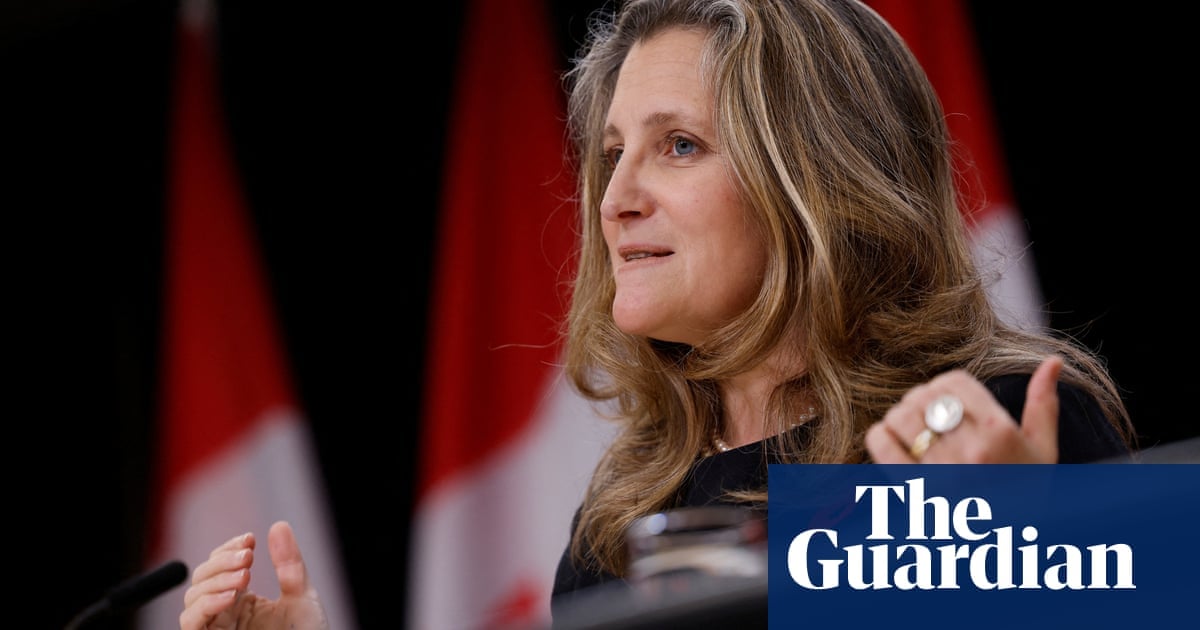Summary
Canada’s Deputy Prime Minister and Finance Minister Chrystia Freeland resigned amid rising tensions with PM Justin Trudeau over Donald Trump’s proposed 25% tariffs on Canadian goods.
Freeland criticized Trudeau’s economic approach, warning of a “grave challenge” and advocating fiscal prudence to prepare for a “coming tariff war.”
Her departure leaves Trudeau politically vulnerable as his popularity wanes, with Liberal MPs and opposition leaders calling for his resignation.
Freeland, a key figure in Canada-U.S. trade relations, is seen as a potential replacement for Trudeau in the next election.



I just hate when people use analogies like that. So she agreed on fiscal policies before, but not anymore?
Seems to me she is rocking the boat, while arguing they should keep dry!
I’m sorry I don’t know her, but this reeks of opportunism.
Just a tidbit of context for you that the article glosses over here:
This is talking about Trudeau deciding to remove temporarily remove federal sales taxes on toys, beer, takeout and dine-in meals, probably in hopes to improve his image over Christmas and blunt the impact of the Canada Post strike. These are sudden, expensive measures that to me it makes sense that Freeland didn’t agree with it. She didn’t start disagreeing out of nowhere.
If they are in a coalition government, how can Trudeau change taxes without her?
He has sufficient support in the Legislature to pass it (where Freeland is only 1 MP), but Freeland was his cabinet minister in charge of the budget and the Deputy PM, who was set to deliver the Fall Economic Statement. The increased spending passed by the Legislature was going to be on her to announce the ramifications of, effectively taking responsibility for the Liberal government. Instead she resigned out of conscience.
How is she only 1 MP when she is deputy PM? IDK how the Canadian parliament works, but here you are part of the government if you have such a title. And the government agree before they make legislation. According to Wikipedia “The office is conferred at the discretion of the prime minister” So the 2 clearly have to work together.
No, the deputy PM is pretty much the subordinate of the PM and can be fired by them at any time.
I know you are genuinely confused just because you are unfamiliar with our system, so I will try to compare it to the US one. It’s like if a US House Rep like Alexandria Ocasio-Cortez, also held Secretary of the Treasury Janet Yellen’s position, and also nominated to a title similar to Kamala Harris.
Trudeau and Freeland are not elected directly as leaders, but they were elected individually in their riding as Members of Parliament (MPs). But the leading party caucus of MPs nominates their leader (Trudeau), then the leader selects their deputy PM (Freeland) and cabinet ministers to lead governmental departments (like MacKinnon, Freeland, Holland etc.), usually following certain conventions. You can read about it here.
The spending measure passes the House of Commons and Senate (Parliament, akin to the US Congress). However, as her role as Minister of Finance she disagrees with the move, so she resigns from that. She will stay as an MP unless she resigns as that, but if she really disagrees with her party she can unalign herself from the Liberal caucus.
That sounds a lot like how it works here (Denmark), Where ministers are the actual government with the Prime minister as the leader, and a government composed min ministers from different parties is a coalition government. That cooperate because no single party has a majority.
No offense, but your question is really confusing. I don’t understand what her resignation has to do with the former supply-and-confidence agreement the Liberals had with the NDP.
ftr - There was never a coalition government and the NDP ended the supply-and-confidence agreement in September.
The right wing in North America flooded news stories and social media spaces with the talking point that the NDP and Liberals working together to accomplish government-related work was a “coalition government” (which they framed as a horrible undemocratic thing), but the NDP-Liberal supply-and-confidence agreement was in place to get Canadians the beginnings of dental care, affordable housing funding for municipalities, daycare, sick days for federally-regulated workplaces, etc.
According to Wikipedia: “The office is conferred at the discretion of the prime minister”
https://en.wikipedia.org/wiki/Deputy_Prime_Minister_of_Canada
How is that not being part of a coalition government?
https://globalnews.ca/news/6032583/coalition-government-explainer-canada/